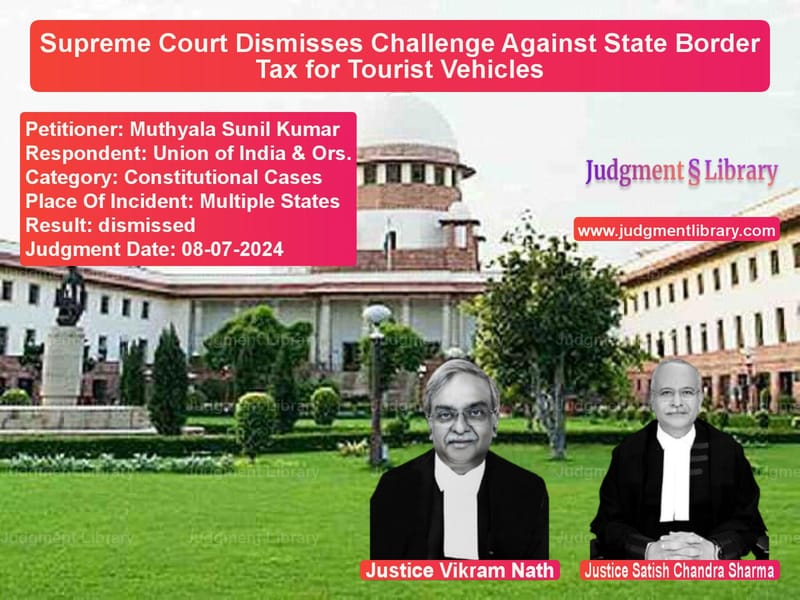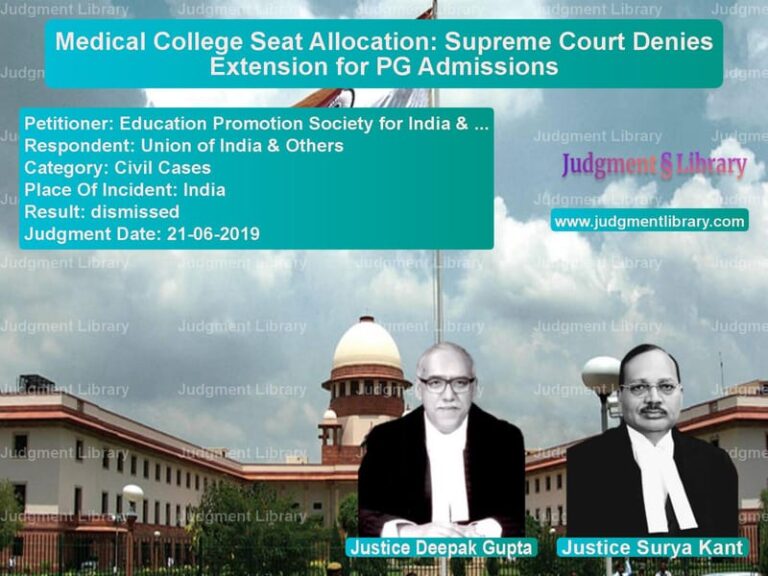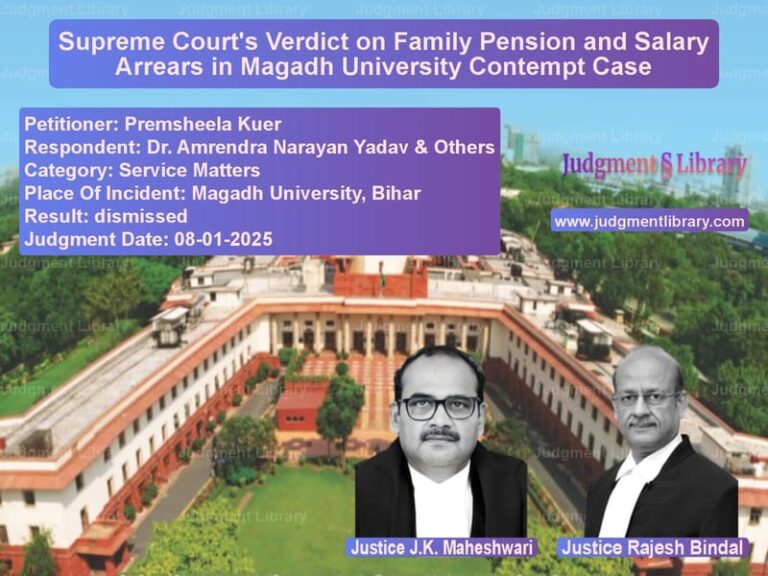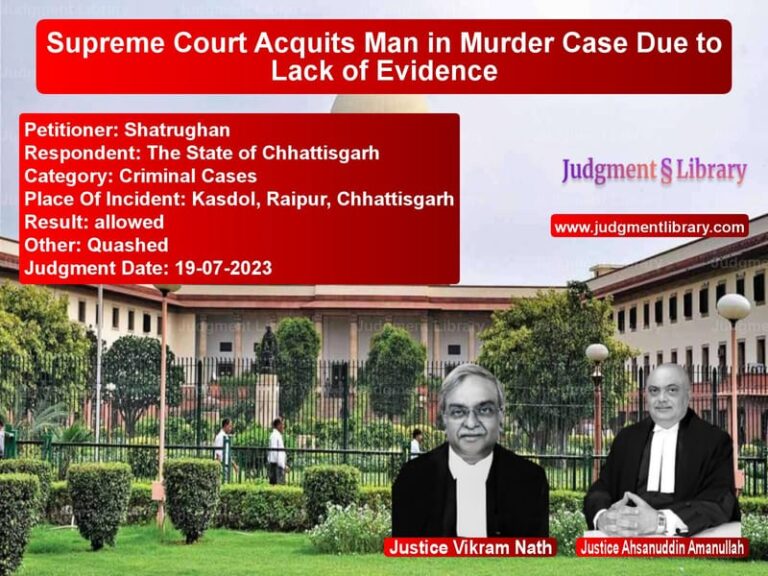Supreme Court Dismisses Challenge Against State Border Tax for Tourist Vehicles
The Supreme Court of India, in its judgment dated July 9, 2024, addressed a series of writ petitions challenging the imposition of Border Tax/Authorization Fee by various State Governments on vehicles operating under the All India Tourist Vehicles (Permit) Rules, 2023. The case, Muthyala Sunil Kumar vs. Union of India & Ors., was brought by multiple transporters and tour operators who argued that these additional levies violated central regulations and amounted to double taxation.
Background of the Case
The case originated from complaints by tourist vehicle operators who alleged that certain State Governments, including Tamil Nadu, were unlawfully collecting Border Tax/Authorization Fees despite the central rules under the Motor Vehicles Act, 1988. These rules were designed to ensure seamless movement of tourist vehicles across states without additional tax burdens. The key issues raised included:
- Whether States had the authority to levy additional fees under their own rules despite central regulations.
- Whether such taxes constituted double taxation.
- Whether transport operators should first approach High Courts before filing a writ under Article 32 of the Constitution.
Petitioners’ Arguments
The petitioners, primarily transport operators, argued that:
- The All India Tourist Vehicles (Permit) Rules, 2023 superseded the 2021 Rules and clearly stated that no additional tax should be levied on vehicles holding an All India Tourist Permit (AITP).
- Despite this, several State Governments continued to charge Border Tax, violating the principle of a unified national transport policy.
- Such additional charges created unnecessary financial burdens on the tourism sector and disrupted inter-state travel.
- The States’ imposition of these taxes contravened the intent of the central legislation under Entry 35 of List III (Concurrent List) of the Constitution.
Respondents’ Arguments
The State Governments defended their right to levy the tax, arguing that:
- The taxes were imposed under State-specific Motor Vehicle Acts framed under Entries 56 & 57 of List II (State List) of the Constitution.
- They had the legislative competence to frame their own tax structures for vehicles entering their jurisdiction.
- The petitioners should have first approached their respective High Courts under Article 226 before filing a direct writ under Article 32.
- Without challenging the validity of individual State enactments, the petitioners’ claims were unsustainable.
Supreme Court’s Observations and Ruling
1. Federal Structure and Taxation Powers
- The Court reaffirmed that while the central government had introduced the 2023 Rules to streamline inter-state travel, taxation remains within the purview of States under List II of the Constitution.
- Unless specifically barred by central legislation, States retain the power to impose levies on vehicles entering their territory.
2. Need to Challenge State Laws First
- The Court held that the petitioners had not challenged the specific State Acts or Rules under which these taxes were imposed.
- Without striking down those provisions, the demand for relief under Article 32 was premature.
- The appropriate remedy was to file petitions before respective High Courts challenging individual State levies.
3. Judicial Review and Legislative Competence
- The Court clarified that it was not ruling on the merits of whether such taxes should be imposed.
- Instead, it emphasized that unless the validity of the State laws themselves was challenged, no blanket relief could be granted.
Final Verdict
- The writ petitions were dismissed with liberty to the petitioners to file fresh challenges before their respective High Courts.
- Any tax already collected would be subject to the final outcome of such cases.
- The petitioners were required to submit undertakings before High Courts stating that, if unsuccessful, they would pay all pending dues.
Key Takeaways
- State Governments Retain Taxation Powers: Unless expressly prohibited by Parliament, States can levy taxes on vehicles entering their borders.
- Transport Operators Must First Approach High Courts: The Supreme Court emphasized the need to exhaust regional legal remedies before invoking Article 32.
- Judicial Review Requires Legislative Challenge: Unless State-specific tax laws are challenged, courts cannot strike down their enforcement.
- Potential for Future Legal Challenges: The ruling leaves open the possibility for transport operators to contest these taxes in High Courts.
Conclusion
The Supreme Court’s ruling clarifies the role of State Governments in imposing taxes on inter-state transport and reinforces the principle that judicial review of taxation policies must follow proper legal channels. The decision ensures that State taxation rights are not arbitrarily curtailed while still allowing affected parties to seek remedies through appropriate forums.
Petitioner Name: Muthyala Sunil Kumar.Respondent Name: Union of India & Ors..Judgment By: Justice Vikram Nath, Justice Satish Chandra Sharma.Place Of Incident: Multiple States.Judgment Date: 08-07-2024.
Don’t miss out on the full details! Download the complete judgment in PDF format below and gain valuable insights instantly!
Download Judgment: muthyala-sunil-kumar-vs-union-of-india-&-ors-supreme-court-of-india-judgment-dated-08-07-2024.pdf
Directly Download Judgment: Directly download this Judgment
See all petitions in Legislative Powers
See all petitions in Public Interest Litigation
See all petitions in Separation of Powers
See all petitions in Judgment by Vikram Nath
See all petitions in Judgment by Satish Chandra Sharma
See all petitions in dismissed
See all petitions in supreme court of India judgments July 2024
See all petitions in 2024 judgments
See all posts in Constitutional Cases Category
See all allowed petitions in Constitutional Cases Category
See all Dismissed petitions in Constitutional Cases Category
See all partially allowed petitions in Constitutional Cases Category







